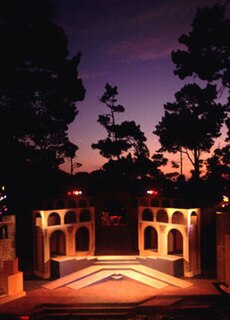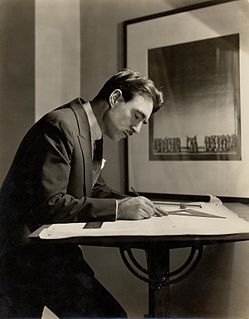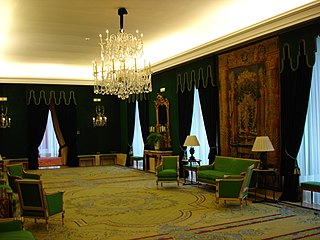Related Research Articles

The following outline is provided as an overview of and topical guide to theatre:

A repertory theatre is a UK theatre in which a resident company presents works from a specified repertoire, usually in alternation or rotation. The Birmingham Repertory Theatre (REP) states in its programmes:

Stage management is a broad field that is generally defined as the practice of organization and coordination of an event or theatrical production. Stage management may encompass a variety of activities including the overseeing of the rehearsal process and coordinating communications among various production teams and personnel. Stage management requires a general understanding of all aspects of production and offers organisational support to ensure the process runs smoothly and efficiently.

In theatre, a lighting designer works with the director, choreographer, set designer, costume designer, and sound designer to create the lighting, atmosphere, and time of day for the production in response to the text while keeping in mind issues of visibility, safety, and cost. The LD also works closely with the stage manager or show control programming, if show control systems are used in that production. Outside stage lighting, the job of a lighting designer can be much more diverse, and they can be found working on rock and pop tours, corporate launches, art installations, or lighting effects at sporting events.

Stagecraft is a technical aspect of theatrical, film, and video production. It includes constructing and rigging scenery; hanging and focusing of lighting; design and procurement of costumes; make-up; stage management; audio engineering; and procurement of props. Stagecraft is distinct from the wider umbrella term of scenography. Considered a technical rather than an artistic field, it is primarily the practical implementation of a scenic designer's artistic vision.
The role of an assistant director on a film includes tracking daily progress against the filming production schedule, arranging logistics, preparing daily call sheets, checking Cast and Crew, and maintaining order on the set. They also have to take care of the health and safety of the Crew. The role of an assistant to the Film Director is often confused with Assistant Director but the responsibilities are entirely different. The assistant to the Film Director manages all of the directors in development, pre-production, while on set, through post-production and is often involved in both personal management as well as creative aspects of the production process.

In show business, the green room is the space in a theatre or similar venue that functions as a waiting room and lounge for performers before, during, and after a performance or show when they are not engaged on stage. Green rooms typically have seating for the performers, such as upholstered chairs and sofas.

1600 Pennsylvania Avenue is a 1976 musical with music by Leonard Bernstein and book and lyrics by Alan Jay Lerner. It is considered to be a legendary Broadway flop, running only seven performances. It was Bernstein's last original score for Broadway.
Running crew, run crew or stage crew, is a collective term used in the theatre to describe the members of the technical crew who supervise and operate ("run") the various technical aspects of the production during a performance. While the "technical crew" includes all persons other than performers involved with the production, such as those who build and take down the sets and place the lighting, the term "running crew" is generally limited to those who work during an actual performance.

A rehearsal is an activity in the performing arts that occurs as preparation for a performance in music, theatre, dance and related arts, such as opera, musical theatre and film production. It is undertaken as a form of practising, to ensure that all details of the subsequent performance are adequately prepared and coordinated. The term rehearsal typically refers to ensemble activities undertaken by a group of people. For example, when a musician is preparing a piano concerto in their music studio, this is called practising, but when they practice it with an orchestra, this is called a rehearsal. The music rehearsal takes place in a music rehearsal space.
Television crew positions are derived from those of film crew, but with several differences.
The technical rehearsal or tech rehearsal is a rehearsal that focuses on the technological aspects of the performance, in theatrical, musical, and filmed entertainment.
The technical crew, often abbreviated to the "tech crew" or simply the "crew", are the people employed behind the scenes ("backstage") to control all the technical aspects of creating a concert, play, musical, opera or other live performance. The technical crew can consist of only a few individuals, or be divided up into a multitude of positions depending on the scale and needs of a particular production.
A theatrical technician, is a person who operates technical equipment and systems in the performing arts and entertainment industry. In contrast to performers, this broad category contains all "unseen" theatrical personnel who practice stagecraft and are responsible for the logistic and production-related aspects of a performance including designers, operators, and supervisors.
Middlesbrough Youth Theatres (MYT) is an umbrella company consisting of Middlesbrough Junior Theatre, earlier known as MLT Juniors, together with a 'Kidstage' group of 7- to 11-year-olds, and an older 'Youth Theatre' of 11- to 18-year-olds. The largest section of the company is the Juniors, a group originally created in 1956.
The following outline is provided as an overview of and topical guide to stagecraft:

Spokane Civic Theatre is a nationally recognized non-profit theatre located in Spokane, Washington. Incorporated in 1947, the theatre is one of the oldest community theatres in the country. In recent years, the theatre has been brought to a level of excellence that has resulted in many awards. The theatre's mission is "to foster an enduring love for live theatre in every community member." Civic, as it is fondly called by the surrounding community, sets a high standard for theatre in the Spokane area.
Nomadic Theatre is a co-curricular, student-led theatre group at Georgetown University in Washington, D.C. in the United States. Focused on being "technically ambitious and socially engaged," it is dedicated to producing new works that have an aspect of social awareness and using the theatre process to allow students to learn about theatre. The group takes its name from its history of having no permanent theatre to work in.

A bullet hit squib or a blood squib is a practical, pyrotechnic special effect device used in the film industry, theatre productions and first responder moulage training to simulate a wound spurting blood from a bullet impact. Even if the portrayal is not necessarily accurate or is exaggerated compared to real-life, filmmakers and the audience have become accustomed to associating this aesthetic with a gunshot wound.

Dead-character costumes are stage clothes worn by actors whose characters are killed off in movies and theatre productions. These costumes are usually distressed or prepared for special effects such as bullet hit squibs, simulating an actor getting shot. Bullet holes are made on the fabric where the squibs were attached. As a result, they usually cannot be reused and end up on the "dead-character rack". Typically, duplicate sets of identical costumes are prepared for the scene. They are kept for a period of time until the end of production, after which they can be auctioned, and/or repaired and donated.
References
- ↑ "What is 'Hell Week' and what does it have to do with musicals?". Rutgers University. 12 November 2015. Retrieved 19 January 2022.
- ↑ Theatrecrafts editors. "Glossary". Theatrecrafts. Retrieved 2014-10-08.
- ↑ Snook, Raven (2013-09-26). "Dry Tech". TDF Theatre Dictionary. Retrieved 2014-10-08.
- ↑ Sykes, Kimberley. "Rehearsal Diary - Tech Week". Headlong Theatre. Retrieved 2014-10-08.
- ↑ Madison, N. (2014-09-14). "What is a Dress Rehearsal?". wiseGEEK. Retrieved 2014-10-08.